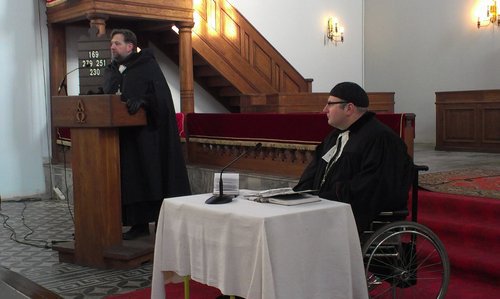The Steering Committee of the WCRC European Area held its last meeting in Vilnius, Lithuania between 23 and 26 January. Last decisions and arrangements were made for the upcoming Area Council to be held in Warsaw, but besides business, solidarity was at the heart of the meeting. Balázs Ódor, ecumenical officer of the Reformed Church in Hungary and vice president of WCRC European Area, was among the WCRC representatives present. This visit closely follows the organization's last trip to Lithuania for the occassion of the Evangelical Reformed Church in Lithaunia's extraordinary synod meeting in March 2013.
The Steering Committee of WCRC Europe, besides having its regular session, also deemed it important to combine “business” with solidarity – an aspect which the committee accepted as its policy a year ago. The Steering Committee met with Rev. Rimas Mikalauskas, Vice-Superintendent of the Evangelical Reformed Church in Lithuania (ERCL) for dinner on 24th January. The conversation ranged over topics including the history of Lithuania, with particular reference to the role of the Reformed Church within it, as well as the current situation and challenges of the church. About 0.2% of the population are reformed, but this figure is holding up in contrast to the decline experienced by the Lutheran Church, the Orthodox Church (both minorities) and the Roman Catholic Church, which at about 76% of the population of Lithuania, is in the distinct majority.
Rev. Mikalauskas described how there are now very significant populations of Lithuanians in Dublin and London, particularly. Some 700,000 Lithuanians now live abroad, leaving about 2.5 million at home. Many small rural villages are now empty of young people and this is presenting serious problems for the church, and for the communities they have left. The pattern seems to be for permanent emigration, rather than going abroad for a few years to work and then returning. There are concerns that Lithuanians living and even being born abroad should retain a connection with the church and with the country, and this is presenting challenges to the church which they are hoping to address.

The Evangelical Reformed Church of Lithuania is one of the nine officially recognised religions in Lithuania, and this confers some advantages and safeguards. It was owing to this status that the government listened and acted appropriately when WCRC, WCRC Europe and various member churches made representations on behalf of the Evangelical Reformed Church over the issue of certain church properties which had been illegally expropriated. This situation has now been happily resolved, and the ERCL is grateful for the support it received from fellow members of the reformed family.
The ERCL is a small church. It has fourteen parishes, of which eight can be said truly to be active, and only five ministers. There are concerns over recruitment of ministers, where they study (there being no reformed seminary in Lithuania) and the retention of young people.
On the Saturday evening, members of the Steering Committee were invited to dinner with the Consistory of the ERCL. The Consistory numbers eight people, four pastors and four lay, who bear executive responsibility between annual meetings of the General Synod. WCRC President, Jan-Gerd Heetderks, was able to bring greetings and explain some of the work of WCRC Europe. The Steering Committee is grateful for the hospitality of the ERCL and for the opportunity to renew and deepen relationships. We are assured that our presence was an encouragement to the ERCL.
The following morning, Jan-Gerd Heetderks, Balázs Ódor and Sandy Horsburgh of the Steering Committee joined the congregation of the Evangelical Reformed Church in Vilnius for morning worship. Having been well warned that the church was cold, we went prepared, the Secretary for instance, resembled a somewhat tweedy Michelin man, sporting a total of seven layers. The warnings had not been exaggerated, the inside temperature being -2°C, but the welcome was certainly warm. The members of the Steering Committee were greeted by name in the service, during which Rev. Mikalauskas preached. Afterwards, along with the congregation of about 50 people ranging in age from teenagers upwards, we retreated to the Parish rooms for a buffet lunch, at which Jan-Gerd was able to bring greetings, explain what we had been doing in Vilnius and the broad purposes of WCRC Europe.
Alexander Horsburgh/Ecumenical Office